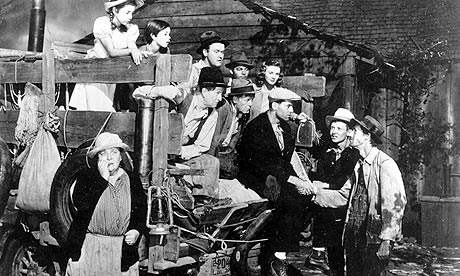The problem is that we have two different definitions of “working class.” One is people who are of a socioeconomic status that involves working blue-collar jobs and not having savings and so forth. The other is angry white people. Angry white men, probably. (For purposes of movie conversations, we might as well assume that women aren’t being considered most of the time.) And if you bring up the term “working class” these days, for political reasons that people may not have fully considered, we’re just going to go ahead and assume it’s the latter.
Honestly, though? There’s an extent to which the media is bad at showing the former definition. Especially because we as a nation forget how broad a definition that can be. For the purposes of plot, people tend to have access to things that aren’t necessarily plausible. I can think of one movie off the top of my head set at a college that realistically deals with the problems of financial aid, and that was twenty years ago. Yes, there’s a practicality aspect to the size of people’s homes—they have to be big enough to fit a camera crew—but I think people in movies go out to eat a lot more often than people at their socioeconomic level should be. They drive better cars. Certainly they have more clothes.
The clothes have honestly long bothered me. People in movies so seldom have realistic wardrobes. And that’s one thing when it’s Nick and Nora Charles, fabulously wealthy and gadding about town. But you start watching things where the characters are supposed to be lower middle class or poor, and you can see that somebody’s spending way more on clothes than they ought. Yes, you can get some good deals if you know how and where to shop, but that takes an investment in time that not everyone has. It’s a balance, and the movies ignore that. Unless the movie is set in New York or is Speed, people seldom ride public transportation. After all, they might get their clothes dirty.
It’s not that I want stories specifically about being working class. We have those, and that’s another place where Chris Pratt’s statement was ill-advised. But one of the only movies I can think of where a character is clearly trying to make do while underemployed—not unemployed, just underemployed—is Ant-Man. Poor people in the movies don’t have college diplomas, and you don’t even want to know how many working-poor friends I have. Many of whom I met in college. I have a friend who’s got a decent job and is living with four other guys he doesn’t even really like very much because it’s the only way he can afford to live near his job without moving back in with his parents.
We can sit here all day and list movies about working class people. Many of them are quite good. Considerably fewer of them have the kind of details that people like me live with every day. I’d argue that the third certainty, after death and taxes, is phone calls from Sallie Mae, and that isn’t part of movie people’s lives. Nobody in the movies uses WIC or EBT. Teenagers working do so to pay for cars or drugs or something, not to support their families or to save up for college. Practically the only adults working service industry jobs are Lester Burnham and Walter White. Or else they’re working that job to show us that they’re still basically children.
I’m not expecting all those British kitchen sink dramas where everyone lives in housing estates and spends half the movie talking about grinding British poverty. But I’m thinking things that, yes, the British seem to do better. Billy Elliot and the miners’ strike. The Full Monty and the struggle to pay child support after the plant closes. Really, most of the Plucky British People genre is a realistic, or semi-realistic, look at poverty. American films tend to stick in notes of affluence even in their movies ostensibly about poor people, and that’s really where we fail in class issues.

